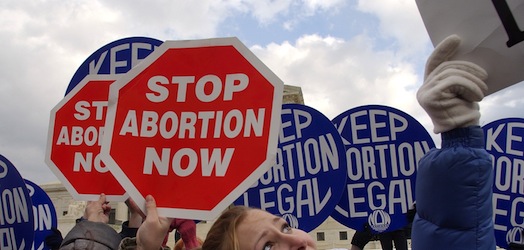Roe v. Wade, Polarized Politics, and the Age of Judicial Activism
Dan Bryan, February 10 2015
Perhaps, on January 22, 1973, the Supreme Court imagined it was settling the abortion issue once and for all when it passed down its Roe v. Wade ruling. But very much the opposite occurred in practice. In society, law, and politics the legacy of this decision has lasted to the current day. Far from settling the debate on abortion, Roe v. Wade ignited it and made it a central issue of the American political debate.
The End of the Judicial Activism Era
For twenty years in cases big and small, the Court had upended many timeworn aspects of American life. Longstanding precedents on segregation, school prayer, criminal rights, due process, and birth control all fell to the sway of the Earl Warren and his successors. Rarely if ever has the Court wielded its power as it did in the 1960s and early 70s.
Roe v. Wade, or more accurately the backlash to it, ended that era. It gave rise to the nascent religious right as an organized, national political force. And it changed to this day the dynamics of judicial confirmation (and by extension, the actual decisions of the Court). After all, when Senators ask a judge about "litmus tests", does anyone think of school prayer or the right to a defense attorney? Or is that term not an obvious reference to abortion? Or when conservatives demand a "strict constructionist", is it not because the connection between privacy and abortion can seem abstract and concocted?
There may not be an entirely direct relationship, but the era of Court activism is noticeably lacking cases from the years after Roe v. Wade. Or in other words, there are many fewer Miranda or Swann decisions after 1973, in part because changing politics in the wake of Roe changed the construction of the Court.
Abortion and Political Realignment
The Republican Party was a different party in the early 1970s. It was much more a coalition of the urban business class and of rural farmers. California, for example, often supported Republican candidates and was the political base for Richard Nixon and Ronald Reagan. There was a much larger moderate wing compared to today. While the party stood for social conservatism in the law and order sense, in line with American values of the 20th century, it didn't organize itself around the issue of abortion. Many Evangelical Protestants voted for the Democratic Party, particularly in the South. Others preferred not to taint their faith with the perils of political activity.
In the wake of Roe v. Wade, this nascent force was awakened. In 1976 it was only halfway formed, and disarmed by the persona of Jimmy Carter as the Democratic nominee. To many of the pro-life persuasion, Carter (with his humble style and Baptist faith) seemed like one of them. Even Michelle Bachmann, for instance, worked for his election that year on the impression that she was helping the pro-life cause.
By 1980, the anti-abortion movement was firmly in the Republican camp, as a direct consequence of the Court. Until the Roe v. Wade case, Jerry Falwell was content to be a preacher. In 1964 he stated, "Preachers are not called to be politicians, but soul winners..."
Yet in the late 1970s, Falwell became one of the most politically influential preachers in the United States. He toured the country for the 1980 election, making speeches against abortion and the Roe v. Wade decision, calling fellow Protestants to action, and advocating for the election of Ronald Reagan. His Moral Majority coalition was an influential part of the Reagan coalition, and one estimate has the Republican share of the Evangelical Protestant vote increasing from 50% in 1976 to 61% in 1980, with further gains thereafter.
 Jerry Falwell
Jerry FalwellIn modern times, the polarization is almost complete. It is almost impossible for a pro-choice Republican or a pro-life Democrat to advance within the American political system. In the nation as a whole, opinion has remained consistently deadlocked, and this promises to be an issue that will survive for many years to come. By and large, conservatives dream of overturning Roe v. Wade, while liberals defend the decision and make sure the judges they appoint feel likewise.
Epilogue: The Life of Norma McCorvey
Interestingly enough, the "Jane Roe" at the center of the Roe v. Wade case converted to the pro-life position. In the early 1990s, Norma McCorvey was working in an abortion clinic in Dallas, Texas. A pro-life group rented space nearby and over time McCorvey became sympathetic to their view, to the point that she eventually became a public activist against abortion.
Recommendations/Sources
- Marian Faux - Roe v. Wade: The Untold Story of the Landmark Supreme Court Decision that Made Abortion Legal
- Clarke D. Forsythe - Abuse of Discretion: The Inside Story of Roe v. Wade
- N.E.H. Hull & Peter Charles Hoffer - Roe v. Wade: The Abortion Rights Controversy in American History, 2nd Edition (Landmark Law Cases and American Society)
- Matthew Avery Sutton - Jerry Falwell and the Rise of the Religious Right: A Brief History with Documents (Bedford Series in History and Culture)


